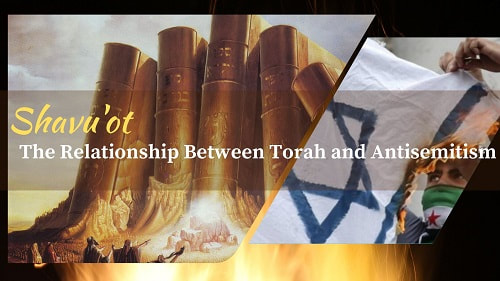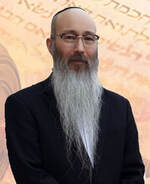|
By: HaRav Menashe Sasson Reporting from Jerusalem, Israel Published in the U.S.A. The Festival of Shavu’ot [שבועות] is celebrated following the counting for seven weeks (49 days) of the omer, and begins 50 days after the Pesah [פסח] (Passover) seder. Thus, the Festival of Pesah [פסח], which commemorates the Exodus from Egypt; the Counting of the Omer; and the Festival of Shavu’ot [שבועות], which commemorates the giving of the Torah on Har Sinai [הר סיני]; are properly viewed not as separate events or holidays, but rather, as the beginning of a process, which ultimately culminates many years later, with the Israelites preparing for a war of conquest, followed by an invasion of Eretz Yisra’el (Land of Israel). The word “Shavu’ot [שבועות]” means “weeks,” as in the seven weeks between the Festival of Pesah [פסח] and Festival of Shavu’ot [שבועות]. In the English language, the holiday of Shavu’ot [שבועות]” is often referred to as the “Festival of Weeks.” This explanation, however, begs the obvious question: Why is the holiday which commemorates the giving of the Torah named for the period of weeks which immediately preceded the holiday? The answer is because the word “Shavu’ot [שבועות]” also means “oaths.” While at Har Sinai [הר סיני], HaShem said to the Jewish people that they shall be to HaShem a “kingdom of priests and a holy nation [ממלכת כהנים וגוי קדוש].” Shemot 19:6. The Jewish people famously responded: “All that HaShem has spoken, we will do [כל אשר-דבר יהוה נעשה].” Shemot 19:8. Thus, we have the “oaths” of the Jewish people to do all that HaShem has commanded. “Shavu’ot” is also the name of a book in the Mishnah, and is the sixth volume in Masekhet Nezikin (which deals primarily with oaths) in the Talmud. As an aside, the Christian religion, which was founded during the Second Temple period, in about the year 3760 on the Jewish calendar, celebrates a holiday known as “Pentecost,” which is celebrated 50 days after Christian holiday of Easter. The name “Pentecost,” which is Greek in origin, means “fifty.” The name of the Christian holiday “Easter” is derived from the Greek word “pascha.” Just as Easter is a holiday which is an adaptation of the Jewish holiday of Pesah, so too, Pentecost is a Christian holiday that is derived from an adaptation of Shavu’ot. The meaning and rituals associated with the Christian holidays of Easter and Pentecost are, however, very different from those of the Jewish holidays of Pesah and Shavu’ot. Returning to Shavu’ot and the giving of the Torah, we learn from the Talmud why the Torah was given on Har Sinai [הר סיני]:
Masekhet Shabbat 89b. In other words, HaShem was not happy with the Gentile nations, who had been offered and rejected the Torah prior to it being given to the Jews. The Gentile nations, for their part, reacted to the Torah with hatred because the Torah, the most politically-incorrect book in history, set moral standards which the Gentile nations rejected. Thus, antisemitism was born. As we can see in modern times, those things that the Torah commands are precisely what the Gentile nations, especially Western nations, as a whole, reject. For example, the Torah mandates self-defense, while many in the Gentile nations move toward criminalizing self-defense and increased levels of gun control. The Torah mandates capital punishment for certain crimes, while many Gentile nations have either abolished, or many in those nations seek to abolish, the death penalty. The Torah forbids homosexual relationships, while many in Gentile nations where it is still illegal, seek to legitimize homosexual marriage. The Torah forbids abortion as a means of birth control, while many in the Gentile nations seek to expand the availability of abortion on demand. The Torah forbids a man from wearing a woman’s clothes, while many in the Gentile nations promote pharmaceutical and surgical efforts to alter a person’s gender. And then there is Medinat Yisra’el (the State of Israel). HaShem gave Eretz Yisra’el (the Land of Israel) to the Jewish people as an inheritance. HaShem brought the Israelites out of Egypt; took them to Har Sinai [הר סיני] and gave them the Torah; and then prepared and commanded them to invade and militarily conquer Eretz Yisra’el.
Debarim 26:8-9. As noted above, the source of Gentile hatred of the Jewish people, that is, the source of antisemitism, is none other than the Torah, which was given at Har Sinai [הר סיני]. Antisemitism exists and, indeed is prevalent, in almost every country. Hardly a day goes by when we don’t read in the news about a crime that was committed against a Jew simply because the victim is Jewish, or a crime committed against Jewish property, such as vandalism of a Beit Knesset (synagogue). Sadly, however, at this particular point time, the most prevalent and most serious incidents of antisemitism, in terms of injuries and deaths, occur in none other than Medinat Yisra’el, the modern-day State of Israel. News from Medinat Yisra’el contains what seems to be never-ending reports of attacks against Jews, whether on public transportation or on the streets of Israel, at entrances to the Old City in Jerusalem, on the roadways and towns of Judea and Samaria, and, of course, the almost constant threat of rockets fired at Israel from Gaza. As Jews, we have little, if any, ability to control or prevent antisemitic attacks on Jews who are in Gentile lands. We do, however, have the ability to prevent antisemitic attacks on Jews in Medinat Yisra’el. “All” (it won’t be easy, of course) it would take is a Jewish-Israeli electorate that would, at the ballot box, insist that the Jewish State abandon its current – failed – policy of pacifism and appeasement, which attempts to integrate Gentiles into the Jewish state and Jewish society and, instead, adopt and implement the Torah as the Jewish Constitution. Only then will we be the Kingdom of Priests and a Holy Nation, which is intended by HaShem. חג שמח Hag Sameah! Copyright © The Israel Foundation. All Rights Reserved.
0 Comments
Your comment will be posted after it is approved.
Leave a Reply. |
THE ISRAEL FOUNDATION





